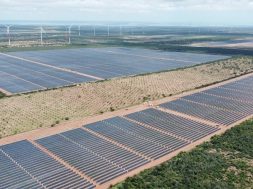
India’s top oil refiner is exploring the use of natural gas and electricity to power vehicles as Prime Minister Narendra Modi’s government envisions multiple paths toward reducing the country’s dependence on petroleum-based fuels. Indian Oil Corp., which supplies about half the oil products to the world’s fastest-growing consumer, is aiming to sell natural gas for vehicles through its existing retail network and has formed teams to research concepts to power electric vehicles, build fuel cells and make different types of fuels including biofuels, according to its chairman.
“We don’t know the kind of energy we’ll have 15 years down the line, but we know we have to be fast and we have a firm plan on how aggressive we will be,’’ Sanjiv Singh said in an interview. “We will be part of the change.’’
India’s efforts to lessen its reliance on oil, as well as cut emissions and its import bill, include a goal to more than double the use of natural gas in its energy mix by 2021 and a proposal to sell only electric cars by 2030. Modi, an advocate of clean energy, has pledged to cut emissions by a third by 2030. “The use of fossil fuels is certainly not going to end any time soon, but progressively it will come down,” said Nitin Zamre, managing director of Indian operations at Fairfax, Virginia-based consultant ICF International Inc. “Everything being said about future fuels is only aspirations as of now. There needs to be clarity on what India is looking at and then frame policies to achieve those goals.”
Electric Options
Modi’s moves have already prompted some Indian companies to expand into alternative energy technologies. Reliance Industries Ltd., along with partner BP Plc, is considering venturing into renewable energy storage. Last month, JSW Energy Ltd., a power producer, announced plans to make electric vehicles. “There could be various ways to supply power and we are not limiting ourselves to batteries,’’ Singh said at the company’s office in central Mumbai. “Whichever becomes more viable, we go more aggressively on those options.’’ The development reflects moves by oil majors such as Royal Dutch Shell Plc, Total SA and Exxon Mobil Corp. to invest in new-energy technologies to improve electricity grids and develop fuels from renewable resources. Singh doesn’t see an immediate threat to the oil business and says electric vehicles still need to beat gasoline and diesel engines in terms of efficiency and emissions. “It’s not the petrol vehicles that are bad, it’s the tail-pipe emissions,” he said. “Euro-6 tail-pipe emissions are hardly anything,” he said, referring to the cleaner fuel standards that will be introduced by 2020. “Someone who is coming with a new solution has to be more efficient than this,” Singh said.
Natural Gas
About 70 percent of vehicles run on diesel in India, one of the world’s top automobile markets. Several of its state-run natural gas companies are seeking to extend the use of gas to trucks and scooters and build infrastructure to fuel long-haul travel. Indian Oil plans to sell compressed natural gas for vehicles through its 26,000 gasoline and diesel retail outlets. The company is also working toward using more gas as a fuel for its refineries to raise the output of its oil products and reduce emissions, Singh said. The company uses fuel oil, a product of refining crude, to power most of its 11 refineries. It plans to replace fuel oil with natural gas in phases and use as much as 40 percent of its existing and planned liquefied natural gas import capacity internally. “Now I use 8.5 percent to 9 percent of my crude as internal fuel,” Singh said. “If I am able to use gas as internal fuel, this can be converted into products. Gas will improve the efficiency of my refinery.”
















